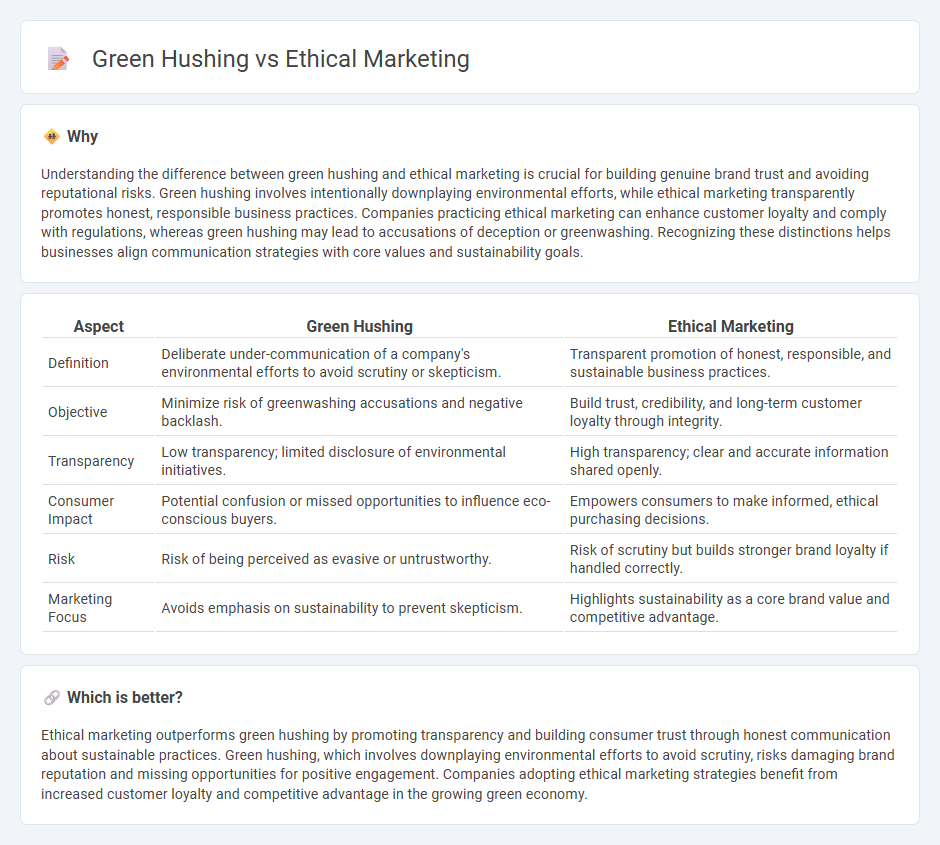
Green hushing conceals a company's environmental efforts to avoid scrutiny or skepticism, while ethical marketing transparently promotes sustainable practices and social responsibility. This contrast highlights the growing importance of authenticity and accountability in corporate communication strategies. Explore the differences further to understand their impact on brand trust and consumer engagement.
Why it is important
Understanding the difference between green hushing and ethical marketing is crucial for building genuine brand trust and avoiding reputational risks. Green hushing involves intentionally downplaying environmental efforts, while ethical marketing transparently promotes honest, responsible business practices. Companies practicing ethical marketing can enhance customer loyalty and comply with regulations, whereas green hushing may lead to accusations of deception or greenwashing. Recognizing these distinctions helps businesses align communication strategies with core values and sustainability goals.
Comparison Table
| Aspect | Green Hushing | Ethical Marketing |
|---|---|---|
| Definition | Deliberate under-communication of a company's environmental efforts to avoid scrutiny or skepticism. | Transparent promotion of honest, responsible, and sustainable business practices. |
| Objective | Minimize risk of greenwashing accusations and negative backlash. | Build trust, credibility, and long-term customer loyalty through integrity. |
| Transparency | Low transparency; limited disclosure of environmental initiatives. | High transparency; clear and accurate information shared openly. |
| Consumer Impact | Potential confusion or missed opportunities to influence eco-conscious buyers. | Empowers consumers to make informed, ethical purchasing decisions. |
| Risk | Risk of being perceived as evasive or untrustworthy. | Risk of scrutiny but builds stronger brand loyalty if handled correctly. |
| Marketing Focus | Avoids emphasis on sustainability to prevent skepticism. | Highlights sustainability as a core brand value and competitive advantage. |
Which is better?
Ethical marketing outperforms green hushing by promoting transparency and building consumer trust through honest communication about sustainable practices. Green hushing, which involves downplaying environmental efforts to avoid scrutiny, risks damaging brand reputation and missing opportunities for positive engagement. Companies adopting ethical marketing strategies benefit from increased customer loyalty and competitive advantage in the growing green economy.
Connection
Green hushing, the practice of companies minimizing or hiding their environmental efforts, directly contrasts with ethical marketing's commitment to transparency and honesty. Ethical marketing promotes truthful communication about sustainability initiatives to build consumer trust and brand credibility. Both concepts highlight the tension between corporate environmental responsibility and authentic stakeholder engagement in marketing strategies.
Key Terms
Transparency
Ethical marketing emphasizes transparency by openly sharing a brand's sustainable practices and social responsibility efforts to build consumer trust and credibility. In contrast, green hushing involves companies deliberately withholding or downplaying environmental claims to avoid scrutiny or backlash, potentially harming reputation and consumer confidence. Explore more about how transparency shapes consumer perception and brand integrity in ethical marketing strategies.
Corporate Social Responsibility (CSR)
Ethical marketing emphasizes transparency and authenticity in promoting Corporate Social Responsibility (CSR) initiatives, highlighting a company's genuine commitment to social and environmental causes. Green hushing involves intentionally downplaying or withholding CSR efforts to avoid scrutiny or skepticism, often reducing public trust and engagement. Explore strategies to balance ethical marketing with effective CSR communication for sustainable brand reputation.
Environmental Claims
Ethical marketing emphasizes transparency and honesty in environmental claims to build consumer trust and promote sustainability, while green hushing involves intentionally downplaying or withholding these claims due to fear of backlash or regulatory scrutiny. Companies practicing ethical marketing often provide verifiable data, third-party certifications, and clear communication about their environmental impact to substantiate their green initiatives. Explore effective strategies to balance ethical marketing with responsible disclosure to enhance brand integrity and customer confidence.
Source and External Links
Ethical Marketing Explained: 4 Principles of ... - Ethical marketing involves principles of fairness, honesty, responsibility, and transparency to promote a company's values and connect with like-minded customers.
Ethical Marketing: 7 Campaigns & Best Practices in Action - This article discusses key principles of ethical marketing, including empathy, fairness, responsibility, transparency, and positive culture, highlighting its benefits for building trust and brand loyalty.
Ethical marketing - Ethical marketing emphasizes delivering qualitative benefits to customers while promoting socially responsible and culturally sensitive business practices.
 dowidth.com
dowidth.com